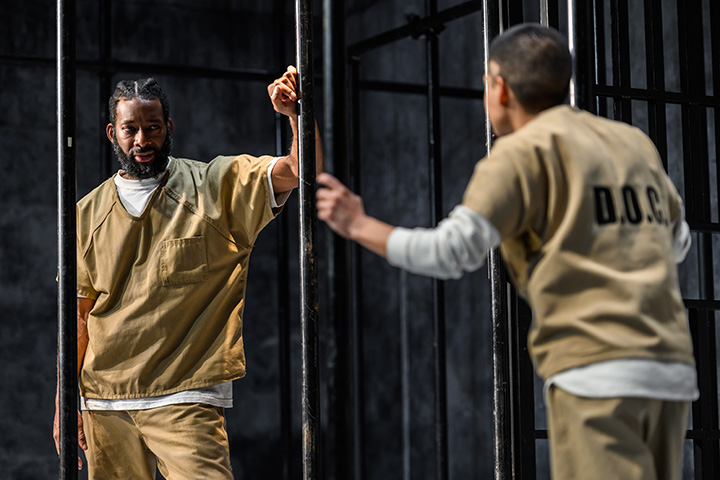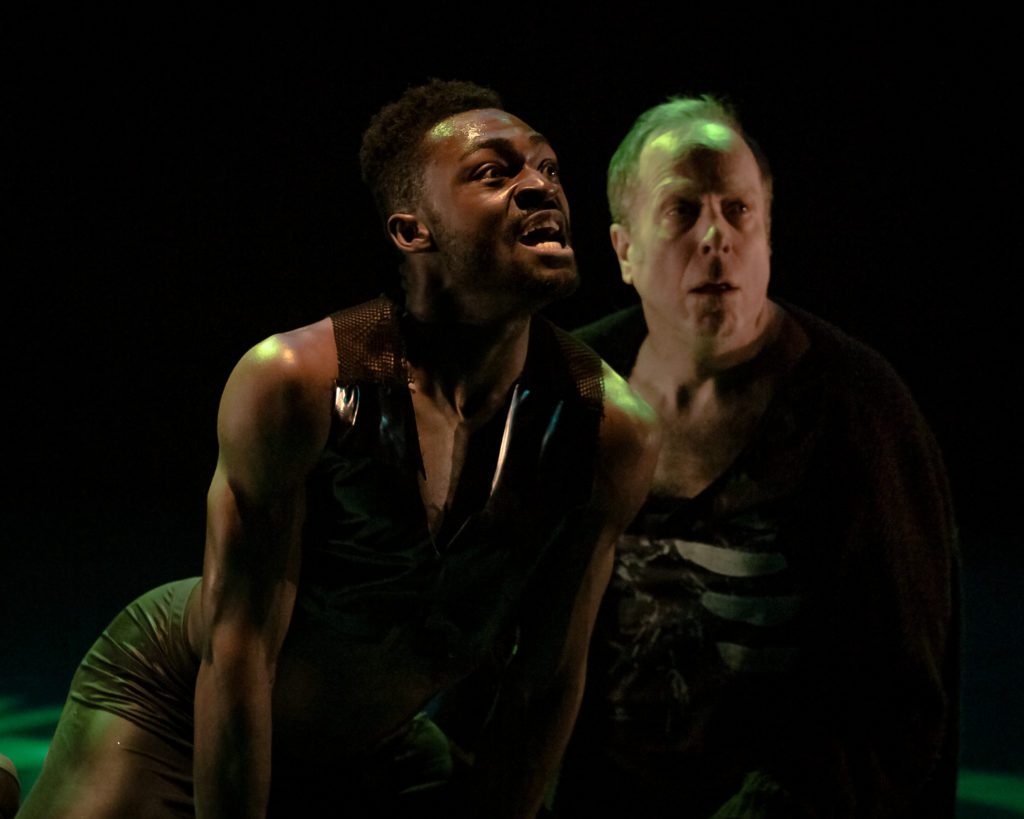A packed week of intriguing theatre events. On-line and live!
Mon., Oct. 19, 2020 (anytime during Oct. 19) to Nov. 1
ON LINE:
CONFLICT
From the Mint Theatre in New York City (a company focusing on rarely done, almost forgotten plays
| Available for Free On-Demand Streaming through November 1st |
| Conflict is a love story set against the backdrop of a hotly contested election. Miles Malleson combines his two great passions: sex and politics. The result is a provocative romance that sizzles with both wit and ideas. Don’t miss out! Stream Conflict byusing the password vote! Click here for details on How to Watch It’s the Roaring 20’s, London. Lady Dare Bellingdon has everything she could want, yet she craves something more. Dare’s man, Sir Major Ronald Clive, is standing for Parliament with the backing of Dare’s father. Clive is a Conservative, of course, but he’s liberal enough to be sleeping with Dare, who’s daring enough to take a lover, but too restless to marry him. Clive’s opponent, Tom Smith is passionate about social justice and understands the joy of having something to believe in. Dare is “the woman between” two candidates who both want to make a better world—until politics become personal, and mudslinging threatens to soil them all. |
Mon. Oct. 19, 2020. 7:30 pm
KEENE
On Line:
Did you love American Moor from Red Bull Theatre? Then you might want to check out KEENE. And yes, Paul Gross, is OUR Paul Gross who is involved in the reading as is Sara Topham.
| A Benefit Reading KEENE By Anchuli Felicia King Directed by Ethan McSweeny Presented in association with American Shakespeare Center This Monday, October 19, 2020 7:30 PM EDT | LIVESTREAM It’s love at first sight for Kai, a Japanese musicologist, when she spies Tyler, the only student of color in his PhD cohort, at a Shakespeare conference. Each night, while Tyler dreams he is the subject of his thesis: Ira Aldridge, the first black man to play Othello, Kai dreams of Tyler. As dreams start to merge with reality, Tyler and Kai are brought closer together. Yet Tyler, like Ira before him, can not perceive the inevitable betrayal of his closest ally. The livestream benefit reading will feature Grantham Coleman, Paul Gross, Carol Halstead, John Harrell, Chris Johnston, Sam Lilja, Amelia Pedlow, Sam Saint Ours, Sarah Suzuki, and Sara Topham. |
| “I wrote Keene as a submission to American Shakespeare Center’s New Contemporaries prize. The prize invites playwrights to write a response play to one of Shakespeare’s works, with his original staging conditions in mind. I felt compelled to respond to Othello because I had such complicated feelings about the play; I found the text and its performance history to be both profoundly rich and deeply fraught. My entry point to Othello’s problematic legacy was to begin researching the life of Ira Aldridge, one of the first black actors to play Othello. The more I read about Aldridge’s career, the more parallels I began to identify between his struggles and modern Shakespearean scholarship, as contemporary academics of color attempted to reclaim a discourse that had historically vilified and excluded them.” KEEP READING |
| This program is part of OTHELLO 2020, a multi-part online initiative to provide an engaging and educational experience for all who are interested in Shakespeare’s Othello and its relationship to the world in which we live today. The benefit series continues through October 28. |
Tues. Oct. 20-30, 2020 at 7:00 pm
Bedtime Stories and other Terrifying Tales
Live in the fields and meadows of 4th Line Theatre:
Ten-year-old Samuel Deyell goes out into the dark night in search of his missing mother.
NOTE: This production travels up and down dark paths and over uneven terrain of the Winslow Farm (home of 4th Line Theatre) for approximately 1 km. Trail difficulty level: moderate to high.
4th Line asks each patron to dress for the weather, wear appropriate, sturdy footwear and bring a flashlight to the performance. Masks and social distancing are required. The performances will run rain, snow or shine.
*Not suitable for people with mobility or health issues. Contains frightening scenes and mature content. PG.
Wed. Oct. 21 7:00 pm
At the Beginning of Time.
Streaming live from Montreal on Centaur Theatre’s website:
| Kicking off the first event under our New Work @ Centaur banner, fans of Mambo Italiano and The St. Leonard Chronicles will be elated to know that it will be the first public reading of Steve Galluccio’s newest play, At the Beginning of Time, streaming live on Centaur’s website at 7PM, Wednesday, October 21th. Dramaturged by the Shaw Festival’s former Artistic Director, Jackie Maxwell, who directed last season’s multi-META-nominated Paradise Lost, Quebec’s elder and health care systems are in the spotlight in this very personal story about losing a spouse to Alzheimer’s in the midst of a pandemic, told with Steve’s characteristic blend of heartache and hilarity. Click HERE to learn more about this highly anticipated event from one of Centaur’s most beloved playwrights. If you’re not able to join us live, the performance will remain on our website until October 28. Wed. Oct. 21 + other dates: 8:00 pm. |
HEROES OF THE FOURTH TURNING.
MULTIPLE DATES
Jeremy O. Harris presents HEROES OF THE FOURTH TURNING Live
Free
Actions and Detail Panel
Free
Select A Date
Event Information
a LIVE theatrical event
About this Event
Jeremy O. Harris Presents
the Playwrights Horizons production of
Will Arbery’s Pulitzer Prize Finalist
HEROES OF THE FOURTH TURNING
Directed by Danya Taymor
Performed LIVE by the original cast: Zoë Winters, Julia McDermott, John Zdrojeski, Jeb Kreager and Michele Pawk
Designed by: Isabella Byrd, Justin Ellington and Sarafina Bush
Showtimes: October 21st @ 8pm, October 22nd @ 4pm, October 23rd @ 8pm, October 24th @ 2pm + 8pm
—–
Winner of ….
2020 Obie Awards for Creative Ensemble + Playwriting
Three Lucille Lortel Awards, including Outstanding Play
New York Drama Critics’ Circle Award for Best Play
New York Times “Best Theater of 2019”
——–
It’s nearing midnight in Wyoming, where four young conservatives have gathered at a backyard after-party. They’ve returned home to toast their mentor Gina, newly inducted as president of a tiny Catholic college. But as their reunion spirals into spiritual chaos and clashing generational politics, it becomes less a celebration than a vicious fight to be understood. On a chilly night in the middle of America, Will Arbery’s haunting play offers grace and disarming clarity, speaking to the heart of a country at war with itself.
——-
ALL TICKETS FREE
All donations will be distributed to NYC-based theater artists in need
Stage Manager: Ryan Kane
Assistant Director: Joan Sergay
Original Scenic Design: Laura Jellinek
Dramaturgy: Ashley Chang
Line Producer: Danya Taymor
Photo Credit: Joan Marcus
Artwork: Jeff Rogers
Thur. Oct. 22, 2020 7:00 pm
Skeleton Crew
Atlantic Theater Company, New York City.
www.atlantictheatre.org
Streaming:
Reunion Reading Series: Skeleton Crew
by Dominique Morisseau Directed by Ruben Santiago-Hudson
Atlantic Theater Company
From the Atlantic Theatre Company in New York City
Fri. Oct. 23, 2020 7:30 pm
CONTRACTIONS by Mike Bartlett
Streaming from Studio 180 www.studio180theatre.com
AN ONLINE PRESENTATION Friday, October 23 at 7:30 PM Directed by Sabryn Rock Starring Virgilia Griffith & Ordena Stephens-Thompson |
| Emma’s been seeing her coworker Darren. She thinks she’s in love. Her boss thinks she’s in breach of contract. In a series of cordial but increasingly tense conversations, the two dissect the differences between “sexual” and “romantic,” negotiate the length of Emma’s interoffice relationship, and face the consequences of shrinking privacy and binding contracts. Following the play, join the cast and Director of Youth and Community Engagement, Jessica Greenberg, for a unique interactive post-show experience in which audience members will share their responses; examine the themes, characters and big questions of the play; and participate in break-out group discussions. |
Sat. Oct. 24, 2020 at 2:00 pm and 7:00 pm
The School for Wives
Live Streaming:
Tony Award–winner Tonya Pinkins stars in the beloved comedy about gender dynamics.
About this Event
Free Virtual Performance + Q&A
The School For Wives
by Molière in the Park
Saturday, October 24 at 2 & 7pm ET
In English
Closed captioning in English & French
Livestream link will be sent via email on the day of the event
Molière in the Park and the French Institute Alliance Française (FIAF), after the success of virtual productions of The Misanthrope and Tartuffe, co-present a radically inventive and refreshing take on the classic play, The School For Wives.
At its core, Molière’s biting 17th-century satire about a privileged and misguided man so intimidated by women that he grooms his own ward for marriage, is about gender power dynamics. In this contemporary retelling, Tony Award–winner Tonya Pinkins (Jelly’s Last Jam, Caroline, or Change) stars as the patriarch Arnolphe, obsessed with keeping 17-year-old Agnès ignorant so that she will remain faithful to him.
Director Lucie Tiberghien examines this classic tale through the lens of an all-woman cast to shine a light on the ultimate absurdity of similar American systems of oppression. Like Agnès, no one’s humanity can be snuffed out.
Performance: 90 minutes
Q&A: 20 minutes
Starring Tonya Pinkins, Tony Award-winner for Jelly’s Last Jam, writer-director of the upcoming socio-political horror film Red Pill, and host of the podcast You Can’t Say That on BPN.fm/ycst
Co-starring Mirirai Sithole, Kaliswa Brewster, Cristina Pitter, Tamara Sevunts, Carolyn Michelle Smith, and Corey Tazmania
Translated by Pulitzer Prize winner Richard Wilbur
Please consider making a tax-deductible donation when you RSVP. Your gift makes programs like these possible and sustains FIAF and Molière in the Park during these unprecedented times.
Produced by Molière in the Park. Co-presented by FIAF in partnership with Prospect Park Alliance and LeFrak Center at Lakeside.
{ 0 comments }

